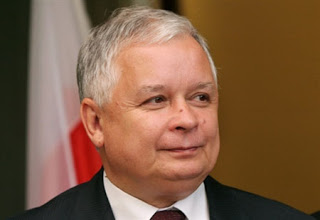Lech Kaczynski – power over the EU without responsibility

So the Polish President Lech Kaczynski is refusing to sign off the ratification of the Treaty of Lisbon. Czech President Vaclav Klaus may do the same this autumn, even if the Czech constitutional court gives the Treaty the OK. It seems that the No vote in Ireland has given these 2 populist politicians the opportunity to break cover and public express their views about the Treaty of Lisbon and, if they do deliver on what they say, essentially condemn the document to the dustbin.
But before those that oppose the Treaty of Lisbon crow ‘thank goodness’ reflect on this: Klaus and Kaczynski, like the population of Ireland, have power to say No to something within the EU, but what do the Presidents of Poland and Czech Republic actually want? Presumably sticking with the Treaty of Nice doesn’t really make them happy either. But better, I suppose, to score a few cheap points in the national media than try to behave in a forward looking manner towards the EU.
Of course Kaczynski’s position would be much more understandable if he hadn’t personally signed the Treaty twice (Brussels and Lisbon) in the first place.
Any international Treaty is by its very nature a compromise.
There will always be bits one group or another feels is not ideal, but the views of those opposing it will not necessarily coincide.
It would indeed be ironic if the free trade/free marketeers from the UK are cheering the pro-CAP or more-social-protection-please voices opposing the Treaty elsewhere.
But it’s always easier to see a no as a no, to go for the headline-friendly soundbite rather than accept that these things are inevitably complex, and ponder where the common interests actually lie.
It’s not too bad all things considering is not much of a rallying cry.
i migth be wrong, but i think they have both participate in the negociation on the treaty.
so, refusing now smells like populistic, opportunistic and narrow-minded.
Jon,
they may be haggling, holding up the process for what they think is their national interest. They may even want the kind of ‘Europe of nation states’ that Thatcher spoke of at Bruges.
Both of the presidents do have responsibility, to their own countries and constitutions, rather than the EU. You’ve got to remember that not everyone believes in the Grand Project, so not everyone feels a responsibility to ensure the furtherance of European federalisation, or whatever the destination is.
@Trooper – fair enough, I can understand you wanting to crow about it. But can you please answer this: by opposing the ratification of the treaty, what do Lech Kaczynski and Vaclav Klaus actually want?
Poland, for example, has been resolutely opposed to any reforms of the Common Agricultural Policy, cause celebre for the British eurosceptics that see CAP as the symbol of all things evil in Europe.
That’s why I entitled this entry power without responsibility – I can understand why both of them have the incentive to whinge, but what do they want instead?
“Klaus and Kaczynski, like the population of Ireland, have power to say No to something within the EU”
Unlike the electorate in the UK.
You’re damn right those that oppose the treaty will crow, we don’t get much to celebrate. You support the Lisbon Treaty, so it annoys you that a leading politician takes the opposite position.
If the Lisbon process can be derailed, who knows what the future will hold? Perhaps Ralf can get his working Union within a hardcore group of nations, and the rest of the EU can take a step back to what the majority in this country (England) seem to want – a looser, trading partner-type relationship.
Concessions or influence… Hard to say. What do either of these 2 actually want? I find that extremely hard to determine.
Plus the two of them are toeing a fine line here – leaders in the EU who play a hard and negative game go against the spirit of the organisation – the effective ones are people who try to build consensus.
Good analysis but is it only about scoring cheap points back home, Jon? I would suggest that they are positioning themselves for concessions, or at least more influence, in whatever happens next.
The dynamism of an outward looking French Presidency, together with a reforming Commission President, bode well. But we must, at the very least, deliver value to the citizens and win their hearts and minds over to the community method before we can move on.
Fifty years of unanimity rule (liberum veto) was more than enough.
Now is the time to build a union that works.